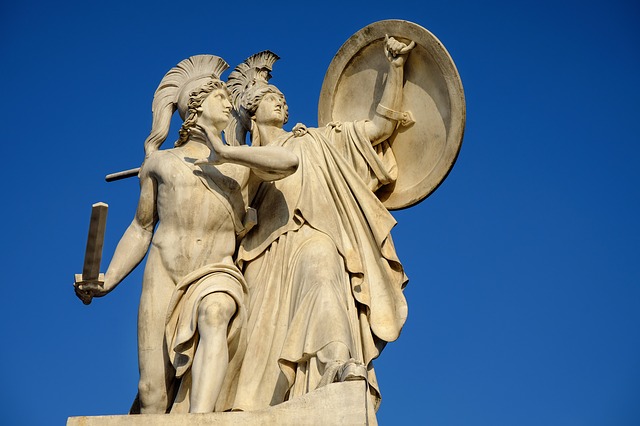ita
Secondo quanto raccontato dai Pelasgi, la dea Atena nasce in Libia e qui fu allevata da ninfe che vivevano in quella regione e vestivano pelli di ovini e caprini. Piccola Atena uccide la sua compagnetta di giochi di nome Pallade ma, il tutto fu un cattivo incidente avvenuto per sfortuna. Erano entrambe impegnate in combattimenti che ponevano in essere scherzosamente, per gioco. Si erano armate di lance e scudi. Atena visse il lutto portandone il segno e facendosi chiamare Pallade unitamente al proprio nome. Platone identifica Atena come dea libica Neith che era di un'epoca dove non si onorava nè si aveva rispetto per la paternità. Le sacerdotesse annualmente ponevano in essere combattimenti anche per giungere ad ottenere il titolo di Grande Sacerdotessa. Lo stesso racconto che Apollodoro pone in essere è una versione patriarcale e tarda della lotta tra Atena e Pallade.Le ragazze libiche si vestivano di pelle di capra, e il nome pallade significa vergine o ragazza. I Greci copiarono le donne libiche che si vestivano allo stesso modo con abiti che avevano striscioline formate da cuoio. Ancora oggi il popolo femminile etiopico veste abiti ornati di conchiglie che ha un significato sessuale alludendo all'organo femminile.Tra il vasellame rinvenuto a Creta si scorgono immagini di immigranti libici che furono nell'isola già nel 4000 a.c. Si ricordi che vi furono altri personaggi mitologici che avevano come nome Pallade e in modo particolare pongo attenzione e curiosità sul Pallade che fu cantato da Omero, descritto come padre della luna,un altro Pallade fu il titano che sposò il fiume Stige e il terzo Pallade che diede vita ai cinquanta Pallantidi, altre sacerdotesse guerriere, e l'ultimo padre di Atena.
eng
According to what the Pelasgi tells, the goddess Athena was born in Libya and here she was raised by nymphs who lived in that region and dressed sheep and goat skins. Little Athena kills her playmate named Pallade, but it was a bad accident that happened due to bad luck. They were both engaged in fights that they played jokingly, for fun. They had armed spears and shields. Athena lived the mourning carrying the sign and being called Pallade together with her name. Plato identifies Athena as the Libyan goddess Neith, who was of an era where neither honor nor respect for paternity existed. The priestesses annually put in combat even to achieve the title of Grand Priestess. The same story that Apollodorus puts into being is a patriarchal and late version of the struggle between Athena and Pallas. The Libyan girls dressed in goatskin, and the name pallade means virgin or girl. The Greeks copied the Libyan women who dressed in the same way with clothes that had strips made of leather. Even today, the Ethiopian women wear dresses adorned with shells that have a sexual meaning alluding to the female organ. Among the pottery found in Crete we can see images of Libyan immigrants who were on the island as early as 4000 BC. Remember that there were other mythological characters whose name was Pallas and in particular I pay attention and curiosity on the Pallas that was sung by Homer, described as the father of the moon, another Pallade was the titan who married the river Stige and the third Pallas which gave life to the fifty Pallantidi, other warrior priestesses, and the last father of Athena.

Downvoting a post can decrease pending rewards and make it less visible. Common reasons:
Submit